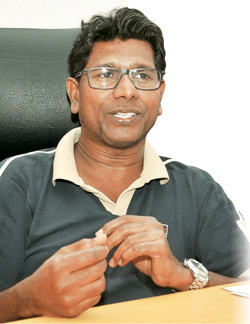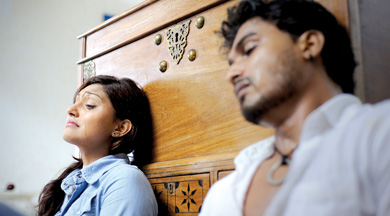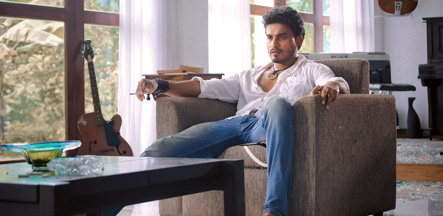|
Adaraneeya Kathawak :
Colombage's melody of love
By Sureshini Pilapitiya
Internationally renowned film director Priyantha Colombage will
release his latest romantic – musical Adaraneeya Kathawak (a melody of
love) shortly. This is his fourth film. Earlier he directed Dehena
(Trance) as a young film-maker. He also directed Vimukthi (Salvation)
and Arumosam Vehi (Fancy rains) which won an award for excellence at the
2007 China International Film Festival.
Adaraneeya Kathawak is co-produced by Chaminda Gamage, the son of
veteran artiste and journalist Dharmasiri Gamage.
|

Priyantha Colombage Pic: Susantha Wijegunasekara |
Editing is by Akila Buddhika, Diran Wijesinghe and Megha Kavinda
Colombage for creative force. Starting his career as a journalist and
photographer in Ravaya, Priyantha Colombage currently works as the CEO
of Creative Force, a leading film , television and audio production
company in Sri Lanka which has created many influential commercials and
documentaries for prestigious brands, and has done some memorable
documentaries, TV programs and teledramas.
In an interview with Montage Colombage collects his unforgettable
moments of his film and media career, his opinions on the film industry
and about his latest film, Adaraneeya Kathawak.
Excerpts:
Question: What made you join the cinematic field?
Answer: I went to Isipathana Vidyalaya, Colombo. I was
interested in photography from the early days. I wanted a medium of self
expression , to express my feelings and emotions. Later on I joined the
Photographic Society which assisted me to become a photographer.
Conveying soul expression through an aesthetic media which can reach
out to the people was my ambition. Therefore, I wanted to join the film
industry.
When I did Dehena I was only 19 years. I wanted to show through the
media the reality that some rituals practised in Sri Lanka were not
appropriate. Thovil and devil dances are done with blind faith. Myths
and beliefs lead us to destruction.
In some instances to cure mental illnesses people hold thovil
ceremonies instead of going to a psychiatrist. The difference is, that
one is scientific and the other primitive. I want to show the waste of
money and time we spend on such rituals.
Dehena won many awards. With this film, a large number of people
entered the Sinhala cinema for the first time. Dehena is Donald
Jayantha's first film. Sivagurunadan came in as Assistant Director.
Anuruddha Jayasinghe was the Production Manager.
 Q: What can you say about your latest film Adaraneeya Kathawak? Q: What can you say about your latest film Adaraneeya Kathawak?
A: I wanted to do a new film based on love and music. I do
quality television commercials and documentaries. I wanted to do a film
which was cinematic and also technically advanced. Nowadays we get only
a few people who are concerned about quality of technology when making a
film.
Directors such as Prasanna Vithanage and Asoka Handagama lead the
industry with their quality, revolutionary films. Somarathne Dissanayake
has taken Sinhala Cinema towards prosperity. If we do not recognise
cinema as an industry, it will die a natural death.It is a
thought-provoking film. The audience will have to understand the
message. We are doing the final touches these days.
Q: When will the film be released to local cinema halls?
A: Most probably in June.
Q: Your other film is, Colomba Ek Raathriyak. Is it focused on
Colombo society?
A: We are still working on it and it is yet to be released. It
is based on human bonds and connections. It also reveals how a person
can change in a second. It is based on the Colombo society, but also
depicts a theme relevant to the whole country.
 Q: What was the support you got from the cast and crew when
you filmed Adaraneeya Kathawak? Q: What was the support you got from the cast and crew when
you filmed Adaraneeya Kathawak?
A: Artistes and technical crew gave their support especially
Donald Jayantha. This is a milestone in Donald's film career and he
reached the fifty notch. Ruwan Costa, Nalin Premathillake and production
manager Asoka Ariyarathne.
They made a wonderful technical crew. I wanted to find upcoming
artistes and Hemal, Bimal, Aruni and Udari gave maximum support. They
acted with passion and feeling. Maureen Charuni and Welegedara
Ranasinghe also contributed.
Style
Q: Chitral Somapala did the back-up singing for the first time
in a Sinhala film, with his identical musical style. It will add a new
outlook to the film music industry, don't you think? What is your
opinion?
A: Chitral has a musical style all his own which can directly
touch the hearts of Sri Lankans. He has a style which feels their rhythm
and pulse.
He will certainly make a difference with his powerful and majestic
voice. Rock music is an influential genre which is appreciated. We are
familiar with Indian music , but we can do many things the western
musical influence.
Q: Tell me about your career as a journalist and a
photographer working at Ravaya. Did it encourage you to start your film
career? How did you find working with Victor Ivan?
A: Ravaya was my whole life. Through Victor Ivan, I have seen
every angle of my life. When I did my first film, I was working at
Ravaya. It helped me to look at society with a different eye.
Victor Ivan is an excellent journalist in Sri Lanka. He has a vision
of the newspaper Industry. He taught us how to handle the pen to raise
human interest in everything we write. He made a difference politically
and socially in the country. He is an extremist, but allowed us to have
our own views.
Q: What do you think about the modern film industry?
 A: If we take world cinema, it is developed and reputed. We
are way behind qualitatively and cinematically. Hollywood and Bollywood
make good money through the Industry. We need to recognise the market to
generate income. Quality films should be introduced. A: If we take world cinema, it is developed and reputed. We
are way behind qualitatively and cinematically. Hollywood and Bollywood
make good money through the Industry. We need to recognise the market to
generate income. Quality films should be introduced.
Q: Do you think that the film industry nowadays is
commercialised ?
A: The cinematic and qualitative side of the film industry are
two different things. Cinema should be commercialised. Siri Parakum is
of high quality. Making films only with the intention of earning money
is not advisable.
Q: Banning or censoring films is common now. What are your
comments?
A: No one has the right to ban a creation or take off a part
of it. In Iranian cinema, they create a film confined to a limited area.
But they make the best films in the world. We have to know how to create
films without being censored.
A film director has a huge responsibility. Self censoring is the best
way to avoid such problems.
Q: We import foreign films. Do you think we depend too much on
them? We also depend on foreign artistes for our films. Can't we do
something on our own without imitating foreign film?
A: We should know how to make use of artistes in our country.
It is only those who are not sure about themselves who depend on foreign
countries. In India, we cannot even take an Indian person to do some
dubbing for one of our creations without the permission of the Union.
The problem is that we are not united to make something of our own
identity.
In 2007, the best children's film in the world was ‘Arumosam Vehi'.
This shows that we can compete with commercial films of any country. We
don't have to depend on anybody and neither do we have to depend on
foreign artistes.
Q: Some international award-winning films which are done by
our directors get a different response from our country. What is the
reason for this?
A: Actually Arumosam Vehi got a fantastic response. In Sri
Lanka, I had a policy problem which was a different issue. At that time,
the cinema halls were bent on showing third class films which were
brought from India.
I requested the authorities to remove all banners, cutouts and
posters from the cinema halls. But I received no response.
|

Scenes from the film |
So I had to withdraw my film. Even though I could not show Arumosam
Vehi I'm glad that it created a concept and a policy to stop obscene
films taking over. Films such as Suriya Arana could be shown because of
that.
Awards
About awards, the question we have is, are each of those awards
internationally recognised or recognised by the film festivals of the
world ? Such films get awards and come and those who are manipulated by
NGO's, they get money, and they are rejected by our country. Films such
as Hansavilak didn't receive any awards, but they were appreciated by
the audience.
Q: How did you feel, directing your first film, Dehena? And
also being the youngest film director?
A: I was not afraid nor nervous. I had experiences from the
technological side. It was a memorable experience and still I cherish
it. Only Suminda Weerasinghe was there as a senior.
Q: When you create a film, are there any aspects which you are
concerned about?
A: It normally takes me around three years to write a script.
I am concerned about the technical staff. They should understand me.
Thirdly, finding artistes according to the acting style. It differs
from one director to another. Some find the film shoot difficult, and
take time to do a good film. But if it is able to produce good results,
that is what is most important.
Q: What do you think of the film trends which have dominated
cinema? Earlier we had children's film trends. Now we have a historical
film trend.
A: If we take history itself then choosing the Mahavamsa is
also something wrong. We do not exactly know how it all began. Do these
people who make historical films study history? Do they know how to read
a rock inscription?
Q: What inspired to start a production company of your own?
 A: If I did some other job I wouldn't have had the freedom to
do my own creations. I would not have been able to produce my artwork or
express my feelings through media. Therefore, I wanted to start a
production company to create the things which I like. A: If I did some other job I wouldn't have had the freedom to
do my own creations. I would not have been able to produce my artwork or
express my feelings through media. Therefore, I wanted to start a
production company to create the things which I like.
Q: What are the themes you are concerned when making a film ?
A: When I was doing Vimukthi I was bent on the political side,
regarding the problems of unemployed youth.
At present, during an era which is overflowing with historical
stories, and which has no love stories, I decided to bring Adaraneeya
Kathawak.
Q: What are your aspirations ?
A: Creating an established and a world-renowned film,
including human bonds which speak to the heart such as Adaraneeya
Kathawak. |

